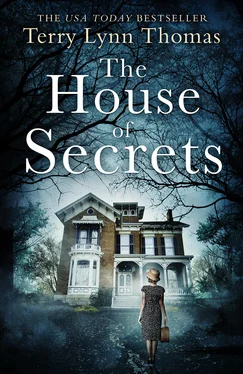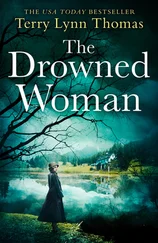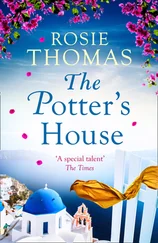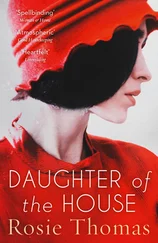She glided into my room in one graceful motion. Her hair had been swept up into a subtle but elegant French twist, and held into place by a silver-filigreed comb. Her black dress flowed over her sinewy body in waves.
‘I come bearing gifts.’ She held out a burlap sack that smelled of lavender and tangerine. ‘It’s soaking salts. I wanted to apologize for bursting in on you today.’
She wore no shoes, so her white feet, with their high arches and callused toes, stood out against the black of her hemline. I recognized those calluses. I had seen them on my adoptive mother, Jessica Bennett, the result of many years spent en pointe as a principal for the San Francisco ballet, a career sidelined after a knee injury.
‘I bought them at City of Paris. There’s a seashell in the bag that you use as a scoop.’
‘They smell wonderful. Thank you,’ I said.
‘You know, Magnin’s victory window broadcasts KYA live each day at noon. Would you like to go some time?’
The radio station’s victory window was quickly becoming famous. Last week Lana Turner showed up and broadcast live on the air, while an enthusiastic crowd gathered outside the window. Was I ready to face a crowded Union Square? The thought of it raised my heart rate.
Not wanting to explain myself, I pretended to hesitate. ‘I’d like to, I’m just not quite ready to be out in public yet. The trial – I encounter hostility at times.’
‘That will pass.’ She moved over to my dresser and stood before my seascapes that lay on top of it. She leaned close and studied them.
‘This room suits you. Its colours are warm and bright. Like you.’ She reached out a finger and traced a slow, sensuous line over one of the paintings. ‘Did you paint these?’
‘No. I brought them from home. They were done by a Bennett Cove artist.’
‘The brush work is remarkable.’ Minna took a deep breath. ‘Listen, Sarah, I wanted to explain what happened to me earlier, if you don’t mind. It’s rather strange and no one believes me.’
‘There’s no need to explain. I understand.’
‘But you don’t.’
I watched with dismay as she sat on my bed, folded her hands on her lap, and kept her eyes riveted on them as she spoke. ‘Twenty-seven years ago I stood Matthew’s brother up at the altar. I left Gregory standing there, rejected him at Grace Cathedral with 200 people as witness. He never forgave me. Two days later he crashed his car, probably on purpose. They said that it was completely incinerated in the fire. The body was burned to ashes. But I think Gregory is here. I’ve seen him. He’s either a ghost come back to get revenge on me for leaving, or he didn’t die at all. I’ve seen him, and I’m frightened.’
I recognized her look of desperation. I had experienced it myself when I had seen things that no one wanted to believe.
‘Tell me,’ I said. ‘Where have you seen him? If he’s alive, the police should be called.’
‘I’ve called the police,’ she said. ‘I filed two reports, but they dismissed me. They had the audacity to tell me I was seeing things and blamed it on the war, if you can believe that. I’m afraid if I call again, they will make good on their threat to have me committed to an asylum. I couldn’t bear that.’
‘But where have you seen this man? Has he spoken to you? Has he threatened you?’
‘I haven’t seen him directly.’ She shivered. ‘It’s the small things. I catch glimpses of him in a crowd. I saw him in Union Square today. I’m certain of it. I smelled his aftershave on my pillow last night.’ Minna shook her head and stood. ‘I’ve said too much. There’s nothing you can do. I just wanted to apologize.’ She stood up. ‘You’re a good listener, Sarah Bennett.’
I grabbed my coat and headed downstairs, all the while wondering what I had got myself into.
* * *
Dr Geisler drove a black Chevy sedan. His medical licence allowed him unlimited quantities of gasoline, which had become so precious since the outbreak of the war. He and Minna sat in the front. Since I didn’t have a very good vantage point in the back, I leaned back and listened to their small talk.
We arrived at a large house situated on Russian Hill and fashioned after an Italian villa. There weren’t any places to park, but that didn’t matter, as a man waited for our arrival. When he saw our car, he waved to Dr Geisler, who pulled up to him and rolled down his window.
‘Dr Geisler? I’m to take your car for you, sir. I’ll park it around the back of the house.’ He opened the door for Minna. I opened my own door and joined Dr Geisler and Minna on the sidewalk in front of the house. ‘Mrs Wills is waiting for you. You can go on up to the house.’
As we got close, the shabbiness of the house became more apparent. It had become difficult in this time of war to find maintenance men, which explained why the paint had faded and greyed in spots. Tall weeds grew in the small lawn, giving the house a look of disrepair, as though no one had cared for the exterior in quite some time. As we approached the front door, I noticed two blue stars, and one gold.
A middle-aged woman dressed in a wool gabardine suit that must have cost the Earth opened the door for us. She wore too much make-up, but had a kind smile that put me at ease. ‘Dr Geisler?’ She spoke in a breathy voice as she extended her hand to him. ‘I’m Virginia Wills. Won’t you come in?’
We stepped into a world of white – white walls, white window frames, and white ceilings – balanced out by a floor constructed of dark wood. An old sideboard, too massive to move, held an old oil lamp. Bright spots on the walls marked the places where the rest of the furniture used to be. A large window encompassed the entire western-facing wall, filling the room with light.
When I moved into the beams that shone through the window, the room grew so cold that my breath came out in curlicues of fog.
Dr Geisler and Minna were busy with Mrs Wills, so they didn’t notice me, shivering and freezing as though I were outside in a snowstorm.
‘Most of the furniture’s been moved out already,’ Mrs Wills explained, ‘but I’ve got tea ready in here.’
The room warmed once again, and I lingered for a moment in a beam of sunlight.
‘This way, please.’
We followed Mrs Wills as she led us down a dark corridor into a sitting room with a bay window that overlooked the street. Two armchairs and two dining chairs had been arranged in a circle, so we would have a place to sit. A tea trolley on rollers held a silver coffee service. Mrs Wills busied herself pouring for the three of us.
‘I’m getting a feeling,’ Minna said. She stood in front of the bay window, bathed in the late morning light, and touched the back of her hand to her forehead.
Mrs Wills gasped.
Dr Geisler narrowed his eyes as he watched Minna turn in a slow circle.
He doesn’t believe her.
‘Somebody has died in this house,’ she said.
‘Yes,’ Mrs Wills said in awe.
Minna held her hands out and tipped her head back. Everyone held their breath. Minna dropped her hands to her sides and shook her head.
‘It’s no good. It’s gone. I’m sorry.’
Minna floated with a dancer’s grace over to one of the chairs. Mrs Wills offered her a cup of coffee, but Minna waved her off, opting to tip her head back and close her eyes in quiet repose.
Mrs Wills set the cup she had offered Minna on the tray. She pulled a handkerchief out of her pocket and dabbed at her eyes. Dr Geisler waited, sipping his coffee, as though we had all the time in the world. When he spoke, his gentle voice echoed off the walls.
‘Would you like to tell us what’s happened, Mrs Wills?’
‘You’re a psychiatrist, correct?’
Читать дальше












